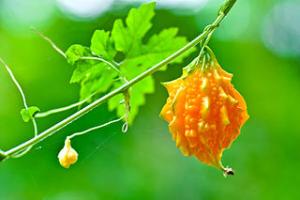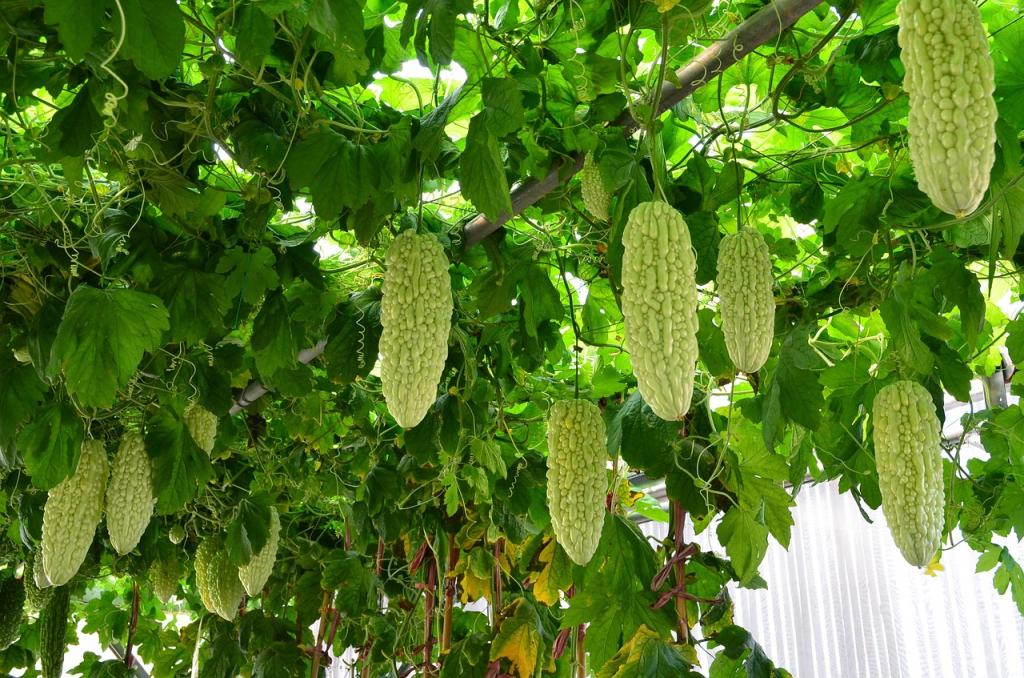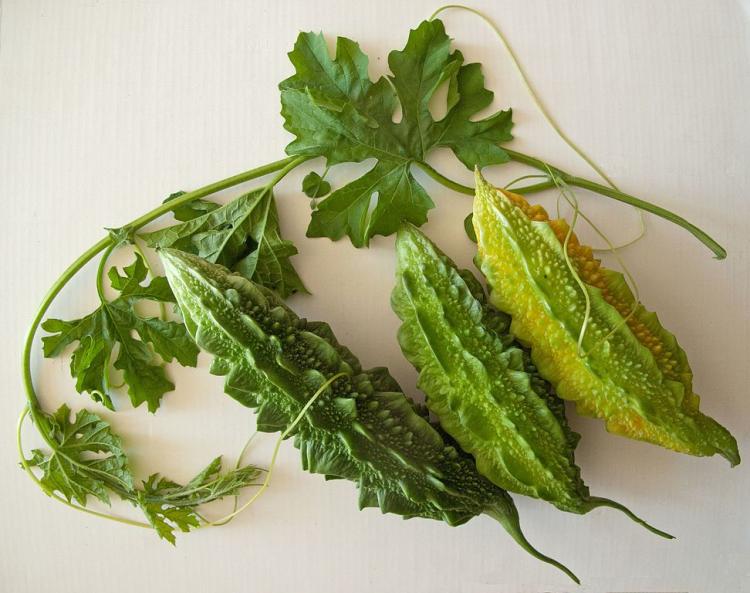Tropical fruit bitter melon appears to lowers blood sugar in type 2 diabetics.

- Supporting and mimicking insulin, the major hormone regulating your blood sugar.
- Reducing absorption of sugar in the small intestine.
- Stimulating enzymes that use glucose to produce energy.
Overview
Bitter melon (Momordica charantia) is a tropical fruit found in Asia, South America, and Africa. It is known by many names, including bitter gourd, bitter apple, and karela (in India), and is recognized by its strong bitter taste and cucumber-like shape.
Although bitter melon is used in some cuisines, it is better known as a traditional remedy for psoriasis, infertility, digestive concerns, infections, and controlling blood sugar in diabetes.1
Today, bitter melon remains a popular supplement for hyperglycemia, taken in the form of whole fruit, tea, powder, and extract. Human research on bitter melon has reported largely positive findings. However, researchers do not consider this evidence strong enough to recommend it as a hypoglycemic supplement in type 2 diabetics.

How Bitter Melon Might Help With Blood Sugar
Bitter melon contains multiple compounds that may have blood-sugar lowering effects, including steroidal saponins, insulin-like peptides, and alkaloids. These compounds are proposed to work through:
Mimicking and supporting insulin activity
Bitter melon contains compounds that have a similar structure to insulin which may be capable of helping control blood sugar by mimicking insulin’s effects.2 In addition, studies have also shown that bitter melon preparations promote insulin release. 3
Reducing glucose absorption
Compounds in bitter melon have also been suggested to reduce glucose digestion by inhibiting its transport in the small intestine. 4
Potential improvement of carbohydrate metabolism
Finally, a study in mice demonstrated that bitter melon can improve carbohydrate (sugar) metabolism by stimulating the activity of enzymes that use glucose to produce energy. 5
Bitter Melon Uses & Benefits for Blood Sugar
Bitter melon supplements are widely used by people with prediabetes and type 2 diabetes to lower their blood sugar. This popular use is backed by multiple clinical studies demonstrating reductions in blood glucose levels and improved glucose tolerance in diabetes patients. However, some of these studies are low-quality and have flaws. In addition, some other studies have reported small or no benefits.
As a whole, the latest review of available evidence concluded that “it remains controversial whether bitter melon has proven benefits in lowering blood sugar among pre-diabetics or aids in slowing the progression to diabetes.” 6
As such, while bitter melon is certainly worth giving a try for blood sugar control, current research evidence remains inconclusive.
Read more: Guide to Blood Sugar Supplements

Research
Human Research
Human studies of bitter melon have been inconclusive. Most studies show that bitter melon fruit, juice, and extract reduce blood sugar levels and improve glucose tolerance in type 2 diabetics. However, a few studies have not shown significant benefits, and most studies of bitter melon are of low quality.
Bitter melon does not appear to significantly reduce blood sugar in diabetics
This randomized, double-blind, placebo-controlled study evaluated the effects of bitter melon on blood sugar levels in diabetics. A total of 40 participants were given placebo or M. charantia capsules daily for 3 months, in addition to standard therapy. Although the bitter melon group had better improvements in HbA1c levels than placebo, this change was not large enough to be significant. In addition, neither group experienced a significant reduction of fasting blood sugar.
- The researchers concluded that “…we are unable to make a definite conclusion about the effectiveness of M. charantia.” 7
Bitter melon pulp drink may reduce blood sugar in diabetics
This study evaluated the effects of bitter melon on blood glucose sugar levels in type 2 diabetics. A total of 100 participants consumed a drink containing bitter melon pulp, causing a significant reduction of both fasting and postmeal blood sugar levels in 86 individuals.
- The researchers concluded that “Drinking of the…vegetable pulp led to significant reduction (p < 0.001) of both fasting and post-prandial serum glucose levels.” 8
Bitter melon tablets (100 mg/kg) appear to improve postmeal glucose and insulin levels in diabetics
This randomized, double-blind, placebo-controlled study examined the effects of bitter melon on diabetics. A total of 40 type 2 diabetes patients were given a single dose of placebo or 60, 80, or 100 mg/kg body weight tablets. Next, they fasted for 8 hours and were given the same meal. Compared to placebo, the 100 mg/kg group experienced significantly lower blood glucose and higher insulin levels following the meal.
- The researchers concluded that “This herbal product has the potential to be used for reducing post-meal hyperglycemia.” 9
Bitter melon (2000 mg) appears to reduce blood sugar in diabetics, but not as strongly as metformin
This randomized, double-blind, controlled study compared the hypoglycemic effects of bitter melon and anti-diabetic medication metformin. A total of 129 patients were divided into 4 groups: metformin 1000 mg or bitter melon pulp powder capsules at 500 mg, 1000 mg, or 2000 mg, daily for 4 weeks. Only the 2000 mg bitter melon group experienced significant reductions in fructosamine (-10.2) – a measure of blood glucose – but this effect was not as strong as metformin (-16.8).
- The researchers concluded that “Bitter melon had a modest hypoglycemic effect...” 10
This two-part study evaluated the effects of bitter melon on blood sugar levels. In part 1, six non-diabetic rats were given M. charantia extract, resulting in reduced blood glucose after an oral glucose tolerance test OGTT) and after a standard meal. Similar effects were observed in nine type 2 diabetic patients, in addition to improved glucose tolerance after eating bitter melon fruit as a daily addition to the diet.
- The researchers concluded that “These results show that karela improves glucose tolerance in diabetes.” 11
This randomized, double-blind, placebo-controlled study evaluated the anti-diabetic benefits of bitter melon. Fifty type 2 diabetes patients were given bitter melon powdered fruit tablets (6 g) or placebo daily for 4 weeks alongside standard hypoglycemic medication. There was no significant change in any blood sugar parameters between the two groups.
- The researchers concluded that “…dried whole fruit of Bitter Gourd has no blood sugar lowering effect, when administered at the dose that was used in this study. “12
Dosage for Blood Sugar
- There aren’t enough studies to suggest a recommended dosage of bitter melon
- Bitter melon supplements are usually sold in 500-600 mg capsules taken once daily
- Multi-ingredient blood sugar support supplements typically contain 50-100 mg of concentrated (4:1) bitter melon extract
Available Forms
- Powdered bitter melon fruit. Sold in capsules or as free powder, this is the most common form used in bitter melon supplements.
- Bitter melon extract. An extract of bitter melon that is either concentrated (e.g. 4:1) or standardized to contain an active ingredient (e.g. 2.5% bitters).
- Bitter melon tea. Dried bitter melon sold in teabags.
- Bitter melon juice. Juice made from bitter melon.
Supplements in Review Recommendation
- Bitter melon, 500+ mg for blood sugar.
We recommend trying bitter melon for blood sugar control. Although some of the research has been criticized and some studies show minor effects, on the whole . However, there are enough studies showing improvements in blood sugar to justify trying ALA to see if it works for you.
Stick to supplement-suggested dosages. Research studies have used different forms and preparation techniques, making it difficult to figure out the ideal dosage. For now, it’s best to stick to 500+ mg dosages provided by most bitter melon products.
Leave a Reply